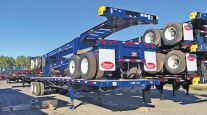Senior Reporter
Truckers Object to New Customs Policy on Tanker Residue
Members of a coalition of truckers, chemical manufacturers, and other trade groups are in discussions with U.S. customs officials over a yet-to-be-enforced, controversial requirement that motor carriers and exporters stipulate on electronic manifests the amount of residual chemicals left inside cargo and portable tank containers when returning from deliveries in Canada and Mexico.
The new requirement, originally set to become effective last August, is a post-9/11 U.S. Customs and Border Protection reversal of a policy dating back to 1994. It was then that the agency told Dow Corning Corp. that it would allow containers with residual chemicals to be entered on customs paperwork as empty containers, saying that because the residue was considered a part of the “instrument of national trade,” a container was allowed to come back into the country without being declared.
Although truckers say containers with hazardous materials already are marked and placarded as required by the U.S. Department of Transportation, customs officials said the policy change is needed to “ensure homeland security and the safety of its inspectors.”
A CBP spokeswoman confirmed that the agency is in discussions with the carrier and export industries, but declined to comment on the specific reasons that the residue is considered a threat to homeland security.
An American Chemistry Council official said the industry remains “baffled” as to why the policy switch was needed.



